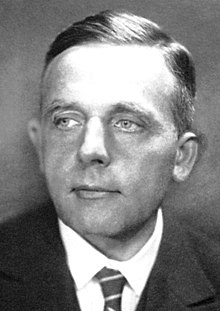
The Warburg hypothesis (/ˈvɑːrbʊərɡ/), sometimes known as the Warburg theory of cancer, postulates that the driver of tumorigenesis is an insufficient cellular respiration caused by insult to mitochondria.[1] The term Warburg effect in oncology describes the observation that cancer cells, and many cells grown in vitro, exhibit glucose fermentation even when enough oxygen is present to properly respire.[2] In other words, instead of fully respiring in the presence of adequate oxygen, cancer cells ferment. The Warburg hypothesis was that the Warburg effect was the root cause of cancer. The current popular opinion is that cancer cells ferment glucose while keeping up the same level of respiration that was present before the process of carcinogenesis, and thus the Warburg effect would be defined as the observation that cancer cells exhibit glycolysis with lactate production and mitochondrial respiration even in the presence of oxygen.[3]
- ^ Warburg O (24 February 1956). "On the Origin of Cancer Cells". Science. 123 (3191): 309–14. Bibcode:1956Sci...123..309W. doi:10.1126/science.123.3191.309. PMID 13298683.
- ^ Mahla, RS; et al. (2021). "NIX-mediated mitophagy regulate metabolic reprogramming in phagocytic cells during mycobacterial infection". Tuberculosis. 126 (January): 102046. doi:10.1016/j.tube.2020.102046. PMID 33421909. S2CID 231437641.
- ^ Vazquez, A.; Liu, J.; Zhou, Y.; Oltvai, Z. (2010). "Catabolic efficiency of aerobic glycolysis: the Warburg effect revisited". BMC Systems Biology. 4: 58. doi:10.1186/1752-0509-4-58. PMC 2880972. PMID 20459610.